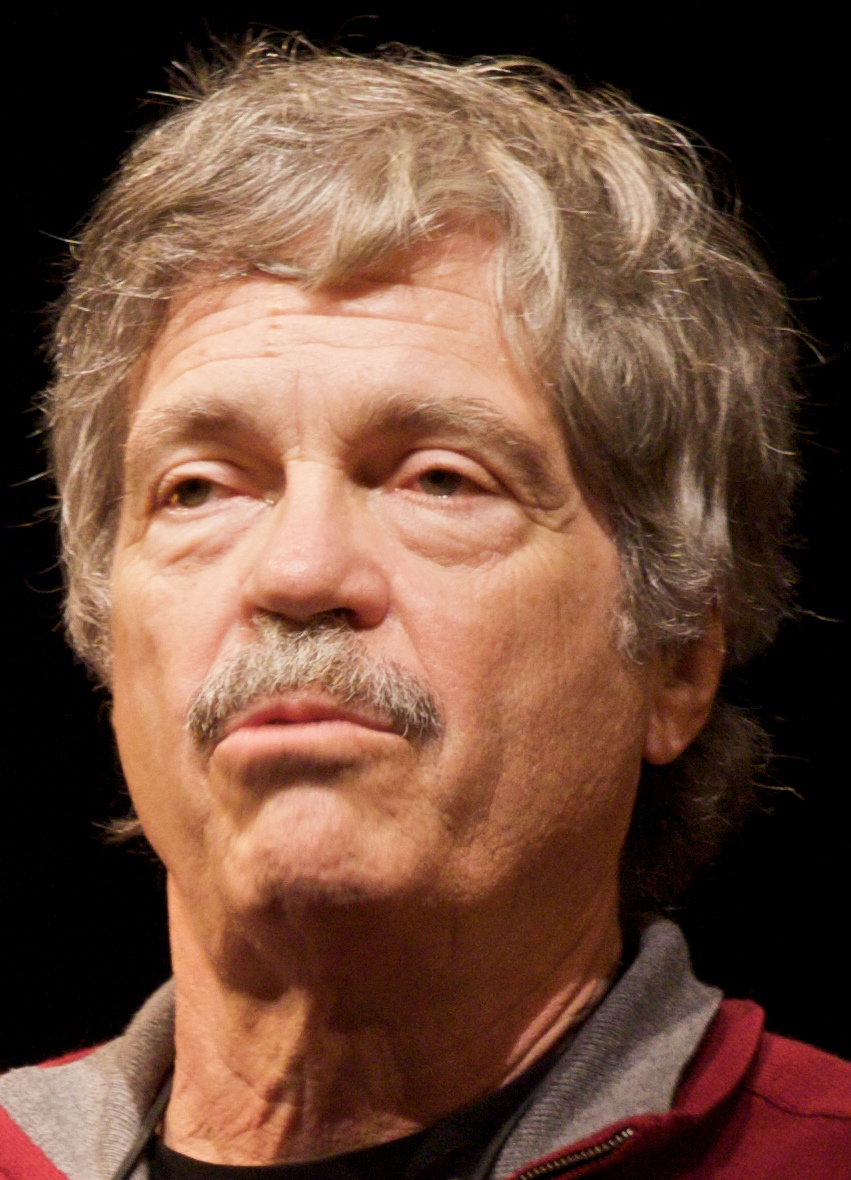“Technology is anything that wasn't around when you were born.”
Hong Kong press conference in the late 1980s
1980s
Alan Curtis Kay is an American computer scientist. He has been elected a Fellow of the American Academy of Arts and Sciences, the National Academy of Engineering, and the Royal Society of Arts. He is best known for his pioneering work on object-oriented programming and windowing graphical user interface design.
He was the president of the Viewpoints Research Institute before its closure in 2018 and an adjunct professor of computer science at the University of California, Los Angeles. He is also on the advisory board of TTI/Vanguard. Until mid-2005, he was a senior fellow at HP Labs, a visiting professor at Kyoto University, and an adjunct professor at the Massachusetts Institute of Technology .Kay is also a former professional jazz guitarist, composer, and theatrical designer, and an amateur classical pipe organist.
Wikipedia

“Technology is anything that wasn't around when you were born.”
Hong Kong press conference in the late 1980s
1980s
“Most creativity is a transition from one context into another where things are more surprising.”
ACM Queue A Conversation with Alan Kay Vol. 2, No. 9 - Dec/Jan 2004-2005 http://queue.acm.org/detail.cfm?id=1039523
2000s, A Conversation with Alan Kay, 2004–05
Context: Most creativity is a transition from one context into another where things are more surprising. There’s an element of surprise, and especially in science, there is often laughter that goes along with the “Aha.” Art also has this element. Our job is to remind us that there are more contexts than the one that we’re in — the one that we think is reality.
“The best way to predict the future is to invent it.”
Alan Kay (1971) at a 1971 meeting of PARC http://quoteinvestigator.com/2012/09/27/invent-the-future/
Similar remarks are attributed to Peter Drucker and Dandridge M. Cole.
Cf. Dennis Gabor, Inventing the Future (1963): "The future cannot be predicted, but futures can be invented."
Nigel Calder reviewed Gabor's book and wrote, "we cannot predict the future, but we can invent it..."
1970s
ACM Queue A Conversation with Alan Kay Vol. 2, No. 9 - Dec/Jan 2004-2005 http://queue.acm.org/detail.cfm?id=1039523
2000s, A Conversation with Alan Kay, 2004–05
ACM Queue A Conversation with Alan Kay Vol. 2, No. 9 - Dec/Jan 2004-2005 http://queue.acm.org/detail.cfm?id=1039523
2000s, A Conversation with Alan Kay, 2004–05
The Computer Revolution hasn't happend yet — 1997 OOPSLA Keynote http://www.youtube.com/watch?v=oKg1hTOQXoY
1990s
ACM Queue A Conversation with Alan Kay Vol. 2, No. 9 - Dec/Jan 2004-2005 http://queue.acm.org/detail.cfm?id=1039523
2000s, A Conversation with Alan Kay, 2004–05
2012 Dr. Dobb's Interview with Alan Kay http://www.drdobbs.com/architecture-and-design/interview-with-alan-kay/240003442
2010s
ACM Queue A Conversation with Alan Kay Vol. 2, No. 9 - Dec/Jan 2004-2005 http://queue.acm.org/detail.cfm?id=1039523
2000s, A Conversation with Alan Kay, 2004–05
Alan Kay (1972) in 1972 Rolling Stone article http://www.wheels.org/spacewar/stone/rolling_stone.html
1970s
“People who are really serious about software should make their own hardware.”
talk at Creative Think seminar, 20 July 1982 https://www.folklore.org/StoryView.py?project=Macintosh&story=Creative_Think.txt
1980s
2010 for Computerworld Australia http://www.computerworld.com.au/article/352182/z_programming_languages_smalltalk-80/
2010s
ACM Queue A Conversation with Alan Kay Vol. 2, No. 9 - Dec/Jan 2004-2005 http://queue.acm.org/detail.cfm?id=1039523
2000s, A Conversation with Alan Kay, 2004–05
ACM Queue A Conversation with Alan Kay Vol. 2, No. 9 - Dec/Jan 2004-2005 http://queue.acm.org/detail.cfm?id=1039523
2000s, A Conversation with Alan Kay, 2004–05
Context: Most creativity is a transition from one context into another where things are more surprising. There’s an element of surprise, and especially in science, there is often laughter that goes along with the “Aha.” Art also has this element. Our job is to remind us that there are more contexts than the one that we’re in — the one that we think is reality.
“A change in perspective is worth 80 IQ points.”
Perspective is worth 80 IQ points.
Point of view is worth 80 IQ points
Talk at Creative Think seminar, 20 July 1982 https://www.folklore.org/StoryView.py?project=Macintosh&story=Creative_Think.txt
1980s
ACM Queue A Conversation with Alan Kay Vol. 2, No. 9 - Dec/Jan 2004-2005 http://www.acmqueue.com/modules.php?name=Content&pa=showpage&pid=273&page=4
2000s
“… greatest single programming language ever designed. (About the Lisp programming language.)”
2003. Daddy, Are We There Yet? A Discussion with Alan Kay http://www.openp2p.com/pub/a/p2p/2003/04/03/alan_kay.html
2000s
1984 in Alan Kay's paper Inventing the Future which appears in The AI Business: The Commercial Uses of Artificial Intelligence, edited by Patrick Henry Winston and Karen Prendergast. As quoted by Eugene Wallingford in a post entiteled ALAN KAY'S TALKS AT OOPSLA http://www.cs.uni.edu/~wallingf/blog/archives/monthly/2004-11.html#e2004-11-06T21_03_42.htm on November 06, 2004 9:03 PM at the website of the Computer Science section of the University of Northern Iowa.
1980s
“Actually I made up the term "object-oriented", and I can tell you I did not have C++ in mind.”
The Computer Revolution hasn't happend yet — 1997 OOPSLA Keynote http://www.youtube.com/watch?v=oKg1hTOQXoY
Alternative: I invented the term Object-Oriented, and I can tell you I did not have C++ in mind.
Attributed to Alan Kay in: Peter Seibel (2005) Practical Common Lisp. p.189
1990s
“Possibly the only real object-oriented system in working order. (About Internet)”
2010 for Computerworld Australia http://www.computerworld.com.au/article/352182/z_programming_languages_smalltalk-80/
2010s
ACM Queue A Conversation with Alan Kay Vol. 2, No. 9 - Dec/Jan 2004-2005 http://queue.acm.org/detail.cfm?id=1039523
2000s, A Conversation with Alan Kay, 2004–05
ACM Queue A Conversation with Alan Kay Vol. 2, No. 9 - Dec/Jan 2004-2005 http://queue.acm.org/detail.cfm?id=1039523
2000s, A Conversation with Alan Kay, 2004–05
ACM Queue A Conversation with Alan Kay Vol. 2, No. 9 - Dec/Jan 2004-2005 http://queue.acm.org/detail.cfm?id=1039523
2000s, A Conversation with Alan Kay, 2004–05
“I hired finishers because I’m a good starter and a poor finisher.”
ACM Queue A Conversation with Alan Kay Vol. 2, No. 9 - Dec/Jan 2004-2005 http://queue.acm.org/detail.cfm?id=1039523
2000s, A Conversation with Alan Kay, 2004–05
Art also has this element. Our job is to remind us that there are more contexts than the one that we're in — the one that we think is reality.
ACM Queue A Conversation with Alan Kay Vol. 2, No. 9 - Dec/Jan 2004-2005 http://queue.acm.org/detail.cfm?id=1039523
2000s, A Conversation with Alan Kay, 2004–05